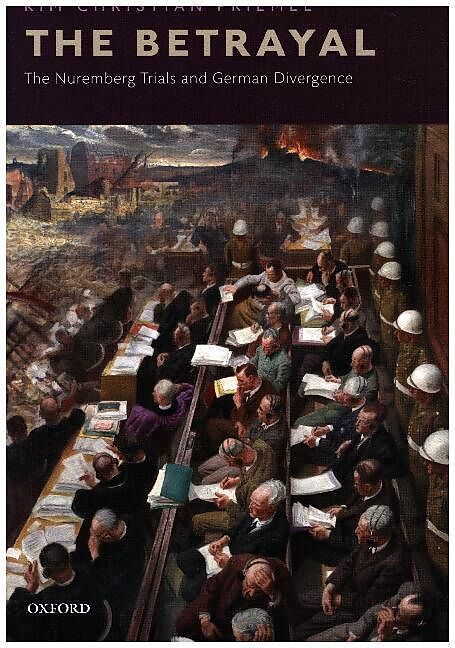The Betrayal
Einband:
Fester Einband
EAN:
9780199669752
Untertitel:
The Nuremberg Trials and German Divergence
Genre:
Geschichte
Autor:
Kim Christian Priemel
Herausgeber:
Oxford Academic
Anzahl Seiten:
496
Erscheinungsdatum:
15.09.2016
ISBN:
978-0-19-966975-2
Examines how the Allies came to terms with how a 'civilised' nation like Germany could perpetrate the crimes of WWII and sought to bring them back to the Western fold. Priemel shows that while many German institutions, which were ostensibly similar to their Allied counterparts, had been corrupted even before Hitler's rise to power.
Zusatztext
With this excellent work, Priemel has written the most complete account of the American trials at Nuremberg we have ... The Betrayal is an exceptional work of legal and intellectual history that highlights powerfully the role that ideas â most notably that of a German Sonderweg â played in Allied efforts to prosecute the crimes of the Third Reich. Just as these trials benefitted historical scholarship in diverse ways, as the author points out, so too should this book contribute to a wide array of fields, from German history to intellectual history to that of transitional justice and human rights.
Informationen zum Autor
Kim Christian Priemel is Associate Professor of History at the University of Oslo. He specializes in contemporary European history, the Third Reich, social and economic history, and legal history. He has authored and edited several books and has published in the Journal of Modern History, the Journal of Contemporary History, and Central European History.
Klappentext
Examines how the Allies came to terms with how a 'civilised' nation like Germany could perpetrate the crimes of WWII and sought to bring them back to the Western fold. Priemel shows that while many German institutions, which were ostensibly similar to their Allied counterparts, had been corrupted even before Hitler's rise to power.
Zusammenfassung
Examines how the Allies came to terms with how a 'civilised' nation like Germany could perpetrate the crimes of WWII and sought to bring them back to the Western fold. Priemel shows that while many German institutions, which were ostensibly similar to their Allied counterparts, had been corrupted even before Hitler's rise to power.
Priemel's research in the American, French, and British government files and in the papers of judges, prosecutors, and defense attorneys expands our understanding of the debates that took place among the Allied prosecution teams.
Autorentext
Hailing from the north of Germany, Kim Christian Priemel studied modern history, public law, and English literature at the Universities of Freiburg and St Andrews. He graduated in 2002 and earned his PhD from Freiburg University in 2007 with a dissertation in business history. After a brief stint at the Munich-based Institute of Contemporary History he joined Viadrina University Frankfurt as an assistant professor in social and economic history. From 2009 to 2016 Priemel was an assistant professor and, from 2013, a Dilthey Fellow of the Fritz Thyssen Foundation at Humboldt University Berlin which he left upon completing his Habilitation with a study of the Nuremberg war crimes trials. He has held research fellowships at the German Historical Institute London, Wolfson College Cambridge, and the Center for European Studies at Harvard University.
Klappentext
Examines how the Allies came to terms with how a 'civilised' nation like Germany could perpetrate the crimes of WWII and sought to bring them back to the Western fold. Priemel shows that while many German institutions, which were ostensibly similar to their Allied counterparts, had been corrupted even before Hitler's rise to power.
Zusammenfassung
At the end of World War II the Allies faced a threefold challenge: how to punish perpetrators of appalling crimes for which the categories of 'genocide' and 'crimes against humanity' had to be coined; how to explain that these had been committed by Germany, of all nations; and how to reform Germans. The Allied answer to this conundrum was the application of historical reasoning to legal procedure. In the thirteen Nuremberg trials held between 1945 and 1949, and in corresponding cases elsewhere, a concerted effort was made to punish key perpetrators while at the same time providing a complex analysis of the Nazi state and German history. Building on a long debate about Germany's divergence from a presumed Western path of development, Allied prosecutors sketched a historical trajectory which had led Germany to betray the Western model. Historical reasoning both accounted for the moral breakdown of a 'civilised' nation and rendered plausible arguments that this had indeed been a collective failure rather than one of a small criminal clique. The prosecutors therefore carefully laid out how institutions such as private enterprise, academic science, the military, or bureaucracy, which looked ostensibly similar to their opposite numbers in the Allied nations, had been corrupted in Germany even before Hitler's rise to power. While the argument, depending on individual protagonists, subject matters, and contexts, met with uneven success in court, it offered a final twist which was of obvious appeal in the Cold War to come: if Germany had lost its way, it could still be brought back into the Western fold. The first comprehensive study of the Nuremberg trials, The Betrayal thus also explores how history underpins transitional trials as we encounter them in today's courtrooms from Arusha to The Hague.
Inhalt
1: Introduction: Drawing Lines
2: Mapping the West: Nuremberg's Textbooks
3: Constructing Nuremberg
4: The Lunatic Fringe, Mostly
5: Paving the Sonderweg
6: Saving Capitalism
7: Trying Modernity or La trahison des clercs
8: East by South-East: The Military Cases
9: Reintegrating the Other
10: After Nuremberg

Leider konnten wir für diesen Artikel keine Preise ermitteln ...
billigbuch.ch sucht jetzt für Sie die besten Angebote ...
Die aktuellen Verkaufspreise von 6 Onlineshops werden in Realtime abgefragt.
Sie können das gewünschte Produkt anschliessend direkt beim Anbieter Ihrer Wahl bestellen.
Loading...
Die aktuellen Verkaufspreise von 6 Onlineshops werden in Realtime abgefragt.
Sie können das gewünschte Produkt anschliessend direkt beim Anbieter Ihrer Wahl bestellen.
| # | Onlineshop | Preis CHF | Versand CHF | Total CHF | ||
|---|---|---|---|---|---|---|
| 1 | Seller | 0.00 | 0.00 | 0.00 |
